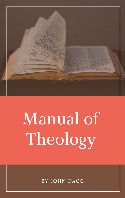Barnes Albert – Commentary
by Albert Barnes
This is an excellent Bible commentary by the Presbyterian minister Albert Barnes.
Albert Barnes (1798-1870)
Albert Barnes was a Presbyterian minister who produced a number of valuable commentaries on the Bible. He wrote Old Testament commentaries on Job, Psalms, Isaiah, and Daniel, and a complete set on the New Testament. These works have been extremely popular in both Europe and the U.S., selling into the millions of copies, though his Old Testament productions are generally considered to be superior to the New Testament works — which were written mostly for Sunday school teachers.

Dagg Manual of Theology (and links to this work in various other formats).
Dagg Manual of Theology (MySword for Android)
Dagg Manual of Theology (theWord Bible Format)
Dagg Manual of Theology (esword format)
Dagg Manual of Theology (PDF Format)
Educated at Princeton seminary, Barnes was a dedicated student. He arose early in the morning and studied by lamplight — which sustained practice almost cost him his eyesight. For forty years he maintained an association with the First Presbyterian Church in Philadelphia.
Barnes had a strong sense of morality and was much opposed to the practice of slavery. In 1846, he wrote a book, An Inquiry into the Scriptural Views of Slavery.He also preached against the use of alcoholic beverages, urging total abstinence.
In 1868, Barnes was invited to deliver a series of ten lectures on “Christian Evidences” in New York. These were subsequently incorporated into a book and constitute a masterful defense of the Christian religion.
Though a Presbyterian, Barnes argued that man possesses freewill; he urged his auditors exercise their power of choice, and to respond to God’s offer of salvation. These views brought him into serious conflict with strict Calvinists. After the publication of his commentary on Romans, Barnes was charged with doctrinal heresy, and put on trial (1835) by his presbytery. Ultimately, the church’s general assembly acquitted him, though with some censure. His teaching on “unlimited atonement” (contra Calvin) helped generate a split in the Presbyterian Church in 1837. Unfortunately, the celebrated commentator was unable to divest himself of all his Calvinistic baggage.
Albert Barnes nurtured some unusual ideas. It is reported that he would not fish with a baited hook inasmuch as he considered that practice to be a form of deception (yet see Mt. 17:27).
Moreover, in his commentary on Job, when discussing the ostrich (39:13ff), he speculated that this curious creature was “the connecting link between quadrupeds and fowls.” Not even this generally conservative scholar was immune to the influence of evolutionism — though his work on Job was published a dozen years before Darwin’sThe Origin of Species came from the press. Too, under the influence of Thomas Chalmers (1780-1847), a Scottish church leader, he subscribed to the “Gap Theory,” which, he conceded, was “designed to solve some of the growing difficulties from the new science of geology.” He was intimidated by the assertions of the “scientism” of his day, hence, in weakness, compromised the biblical view of creation.
In December of 1868, at the age of 70, he delivered an address in Philadelphia titled, “Life at Threescore and Ten,” which contained his reflections on things he had learned, and had come to appreciate over the years. At the conclusion of his presentation, he cited these lines:
May some disease, not tardy to perform
Its destined office, yet with gentle stroke,
Dismiss me weary to safe retreat
Beneath the turf that I have often trod.
He hoped to die a quick death, rather than one of lingering agony. Coincidentally, two years later to the month, he died instantly while making a call of condolence at the home of a friend.
It is a sad footnote to history that Barnes has largely been ignored in the biographical sketches of influential theological writers. In the New International Dictionary of the Christian Church, he merits only a half-dozen sentences, while the infamous Karl Barth is granted an entire page. In the Oxford Dictionary of the Christian Church he is mentioned not at all.
Article taken from Christian Courier
Barnes Albert – Commentary
 Divine use of Sickness
CP34 Divine use of Sickness
Divine use of Sickness
CP34 Divine use of Sickness
Read this tract by Pastor Cox about the divine use of sickness explains how God works with sickness to remind man of his limited time on earth, the consequences of sin, etc.
In this tract Pastor Cox explains how God positively uses sickness to help us turn our thoughts and attention to the eternal. We get so involved in our daily lives sometimes that we forget that our life is but a vapor on this earth, soon to no longer be. God uses sickness as a severe warning that our time is running out, and we need to live as though every moment has a forward view towards eternity. How we spend our life is important.
Sections:
1. Understanding that God is God
2. Sickness because of Sin
3. Warning about approaching Death
4. Warning about Human weakness
5. The Error of the Sick
6. God listens to those who ask in sincerity
Job 13:15 Though he slay me, yet will I trust in him: but I will maintain mine own ways before him.
There is an attitude within much of Christianity that sickness in any form is bad, and God does not have anything to do with it. For these Christans, they ask God to take the sickness away, and sometimes (as though it was their right to be health) that they demand God to remove their sickness. The reality of life is that they continue ill, and many have a crisis of faith over this. For them, God is impotent, or God does not love them. In other words, their confidence, faith, and love of God depends on God always sending them good things. But this is not how the Bible indicates life is. God uses calamity and sickness for His own purposes and we have to understand this (and accept it).Please support our tract ministry by donating on the tract website (see sidebar). Because of your donations we can offer these tracts online, and for free. Read the Tract CH34
Please donate on sidebar to help support this website.
MySwordmodules is a website dedicate to the MySword Bible Program for Androird devices. We host MySword Modules.

Old Carpenter Tools of his Trade is an explanation of why I, Pastor-Missionary David Cox, write my own materials like tracts, books, sermons, Sunday School material, etc. We produce the material that we use in our ministry and also for evangelism.
Read the short article: Old Carpenter Tools of his Trade.
